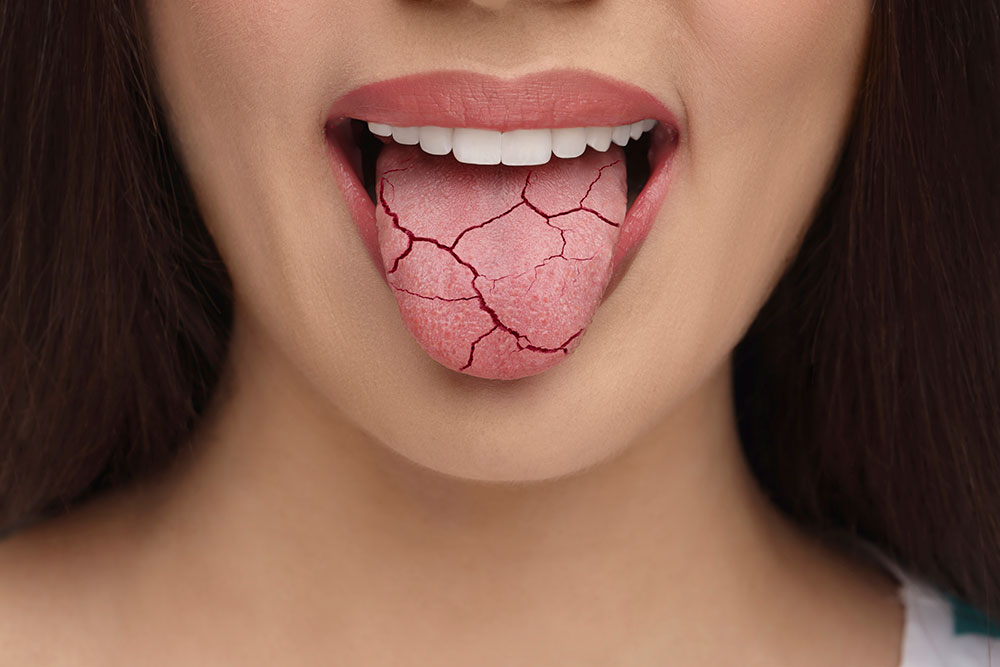Dry mouth, medically known as xerostomia, is characterized by a lack of saliva production. While occasional dry mouth is normal for most people, persistent dryness may cause difficulty speaking, discomfort and an increased risk of dental problems. Fortunately, treatment options exist to alleviate symptoms and promote oral health.
Causes of Dry Mouth
Medications: One of the most common causes of dry mouth is medication. Specific prescription and over-the-counter drugs, such as antihistamines, decongestants, antidepressants, and diuretics, can interfere with saliva production, leading to dryness. If you suspect that your medication is causing dry mouth, consult your healthcare provider to discuss alternative options or adjustments to your dosage.
Medical Conditions: Various medical conditions may contribute to dry mouth. These include diabetes, Sjögren’s syndrome, HIV/AIDS, Parkinson’s disease, and autoimmune disorders. Additionally, radiation therapy and chemotherapy used to treat cancer can damage salivary glands, resulting in dry mouth as a side effect.
Lifestyle Factors: Certain lifestyle factors can worsen dry mouth symptoms. Using tobacco products may dry the mouth and increase the chance of gum disease and tooth decay. Constant breathing through the mouth due to nasal congestion or sleep apnea can also contribute to dryness.
Dehydration: Dehydration is present when the body loses more fluid than is ingested, leading to decreased saliva production. Factors such as excessive sweating, vomiting, diarrhea, fever, and inadequate fluid intake all contribute to dehydration and subsequent dry mouth.
Treatment Options for Dry Mouth
Stay Hydrated: Consuming lots of water throughout the day will help keep the mouth moist and alleviate dry mouth symptoms. Choose water or sugar-free beverages, and reduce intake of caffeinated or alcoholic drinks, as these can contribute to dehydration.
Sugar-Free Options: Using sugar-free products, such as gum or candy can stimulate saliva production and provide temporary relief from dry mouth. Look for products containing xylitol, a sugar substitute that has been shown to stimulate saliva flow and reduce the risk of tooth decay.
Saliva Substitutes: Over-the-counter saliva substitutes are available in the form of sprays, gels, and rinses. These products mimic the lubricating properties of saliva and can provide relief from dry mouth symptoms. Consult your dentist or healthcare provider for recommendations on suitable saliva substitutes.
Prescription Medications: Prescription medications may be necessary to manage severe or chronic dry mouth. These may include medications that stimulate saliva production (e.g., pilocarpine or cevimeline) or medications that address underlying medical conditions contributing to dry mouth.
Oral Hygiene: Maintaining proper oral hygiene is a must for preventing complications associated with dry mouth, such as tooth decay and gum disease. Brush your teeth at least twice daily with a fluoridated toothpaste, floss daily, and visit your dentist regularly for check-ups and cleanings.
Dry mouth can be challenging to manage, but with the right approach, symptoms can be alleviated, and oral health can be maintained. By addressing underlying causes such as medication side effects, medical conditions, and lifestyle factors and implementing appropriate treatment options such as staying hydrated, using saliva substitutes, and practicing good oral hygiene, individuals can effectively manage dry mouth and improve their overall quality of life. If you’re experiencing persistent dry mouth symptoms, consult your healthcare provider or dentist for personalized advice and treatment recommendations. Contact us to schedule your dental visit today.

